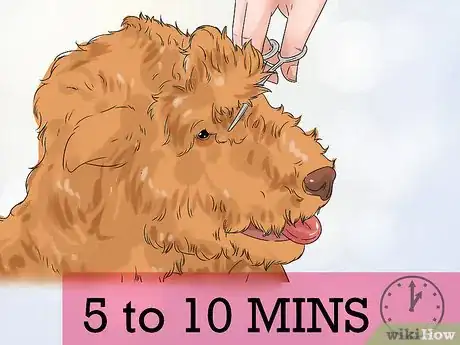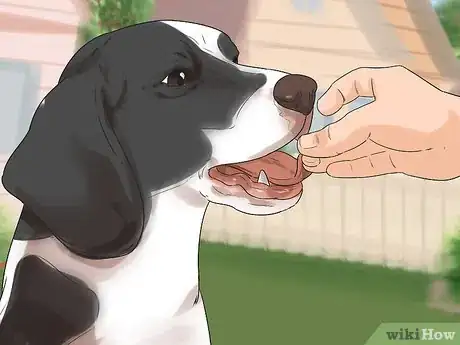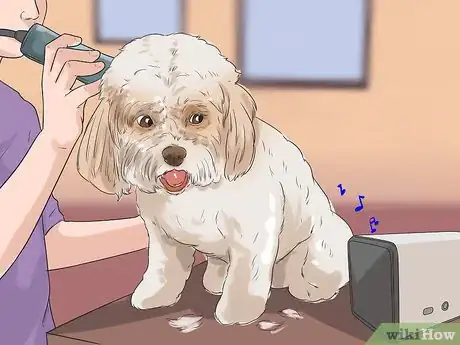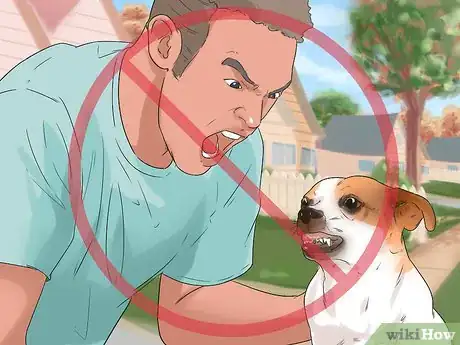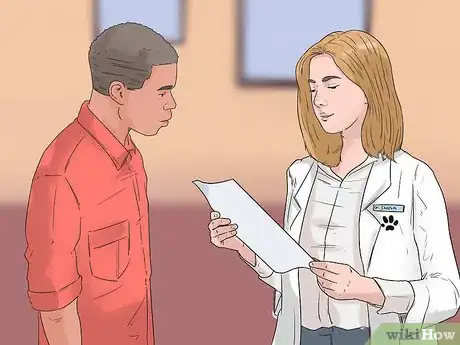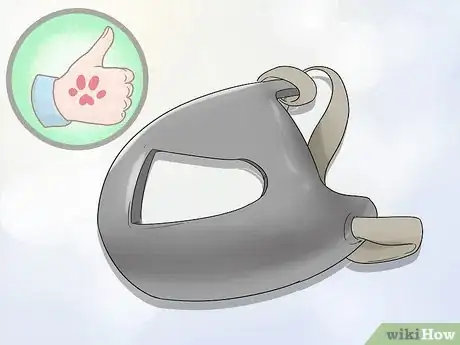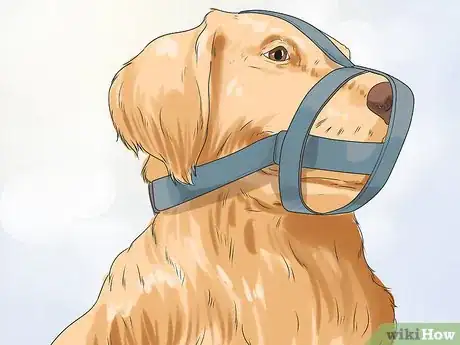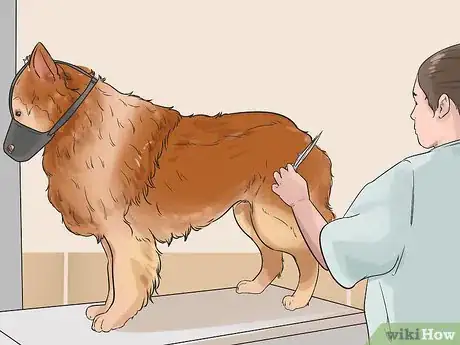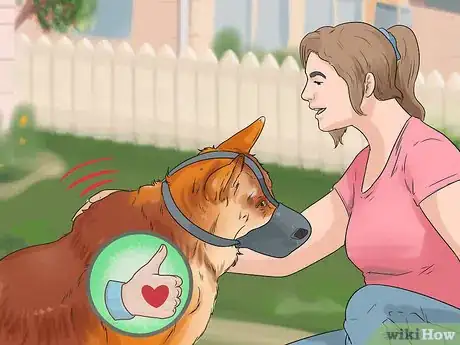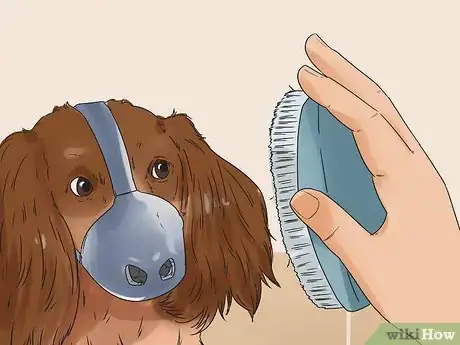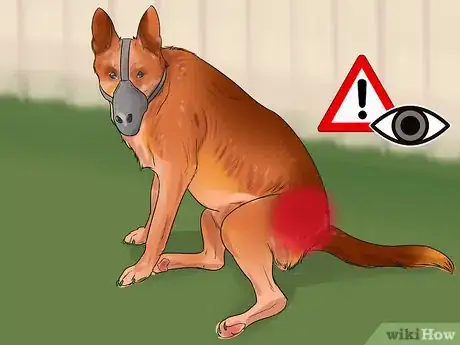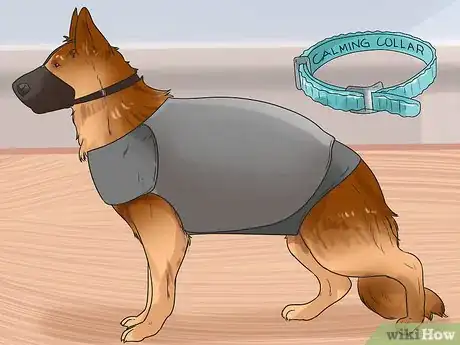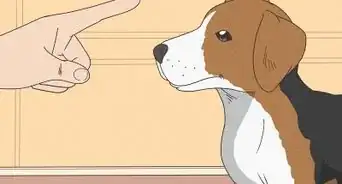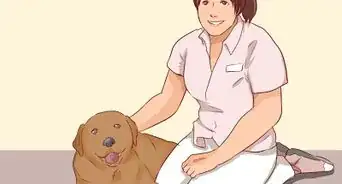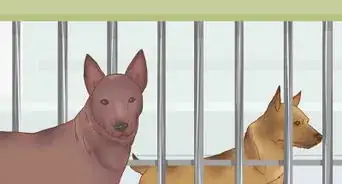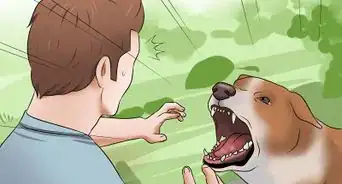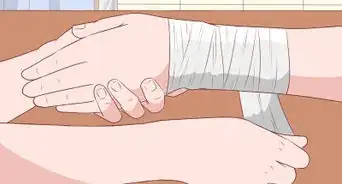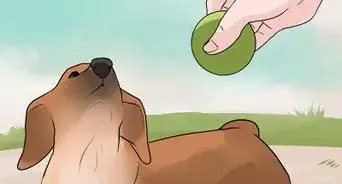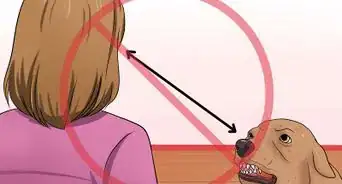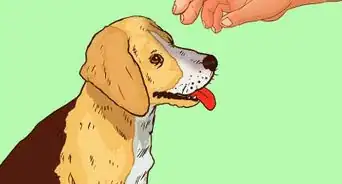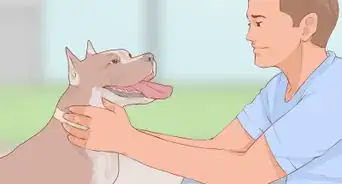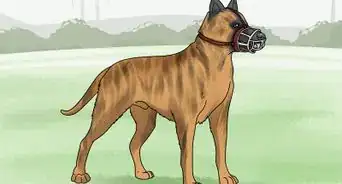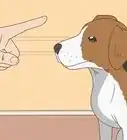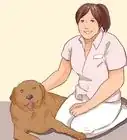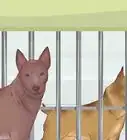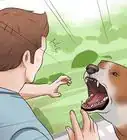This article was co-authored by Lancy Woo. Lancy Woo is a Certified Pet Groomer and the Owner of VIP Grooming, a pet grooming salon based in San Francisco, California. VIP Grooming has served San Francisco for over 35 years. Lancy received her pet grooming certification from the WWPSA (Western Word Pet Supply Association). VIP Grooming has been voted "Best in the Bay" in 2007, 2010, 2011, 2014, 2017, 2018, and 2019 and won Bay Woof’s "Beast of Bay" in 2014. In 2018, Lancy's work contributed to VIP Grooming's acceptance onto San Francisco's Office of Economic and Workforce Development's Legacy Business Registry.
There are 7 references cited in this article, which can be found at the bottom of the page.
This article has been viewed 92,156 times.
Grooming a dog can be a pleasurable experience…until that dog bites. A dog that bites while being groomed will do for several reasons, such as fear of grooming, self-defense, or a painful medical condition. Not grooming the dog is not an option, though, because grooming is important for a dog’s appearance, hygiene, and overall health.[1] If your dog bites while being groomed, you will need to make grooming pleasurable, learn when and how to use a muzzle, and make your dog comfortable with the grooming process.
Steps
Making Grooming Pleasurable
-
1Keep grooming sessions short. Long grooming sessions can increase a dog’s stress, fear, or pain, causing it to bite. Make your dog’s grooming sessions short—maybe just 5 to 10 minutes. Don’t worry if you don’t finish all the grooming. You can always come back to it later.
- If you’d rather do the grooming all at once, give your dog breaks during the grooming session.[2]
- When you let your dog take a break, let it come back to you when it’s ready.
-
2Offer tasty treats. When your dog is behaving well during the grooming session, give it a tasty treat.[3] The treat will help your dog associate grooming with something positive. When your dog recognizes that grooming is a good thing, it won’t feel the need to bite.
- Give your dog a treat that you’ll use only for grooming.
Advertisement -
3Redirect your dog’s attention. If your dog is focused on everything it doesn’t like about being groomed (nails trimmed, ears cleaned), it may respond by biting. Turning on some soothing music or letting your dog look out the window will allow your dog to focus on something positive and relaxing.[4]
- You could also talk to your dog throughout the grooming session. Use a soothing voice to put your dog more at ease.
-
4Do not punish your dog when it growls. A growl is a dog’s warning signal that it’s about to bite or attack. If you punish your dog when it growls, you’re taking away its warning signal.[5] Without that warning signal, your dog will bite suddenly, putting you in danger.
- Rather than punish your dog, stop the grooming session completely or let your dog take a break.
- Punishing a dog does not improve its behavior.
Using a Muzzle
-
1Talk with your vet. A muzzle will protect you if your dog tries to bite while being groomed.[6] It won’t, however, calm your dog down or help your dog enjoy being groomed. In fact, your dog may become even more difficult to groom if you use the muzzle incorrectly. Before purchasing a muzzle, talk with your vet.
- Because many types of muzzles are available, you’ll need your vet’s expertise to decide which muzzle to choose and learn how to use it safely.
- Use the muzzle as a last resort. Try other methods of keeping your dog calm before using the muzzle.
-
2Select a comfortable muzzle. Mesh or fabric muzzles are commonly used for grooming. However, because they don't allow a dog to eat, pant, or drink, they should be used for short periods of time only. A plastic basket muzzle can also be used. Your dog would be able to eat, pant, and drink comfortably with a plastic basket muzzle on.[7]
- Whichever muzzle type you choose, ensure that it fits your dog comfortably, but snugly. You don’t want it coming off if your dog tries to bite.
- The strap around the neck should fit snugly. If you choose a basket muzzle, make sure the basket area allows enough room for your dog to eat, pant, and drink.[8]
- The muzzle’s strap around the neck should fit like your dog’s collar.
-
3Get your dog comfortable with wearing the muzzle. Your dog isn’t going to be thrilled about wearing a muzzle. However, if it becomes comfortable with it, and gets rewarded while wearing it, you’ll feel much more protected during the grooming process. Here are some tips to get your dog comfortable with the muzzle:[9]
- In the beginning, reward your dog when it looks at the muzzle.
- Make the muzzle enticing by putting a tasty treat like peanut butter in the nose part of the muzzle.
- When you put the muzzle on, leave it on for just a few seconds at first. Then, work up to longer periods of time.
- Always reward your dog when it has the muzzle on so it associates the muzzle with something positive.
-
4Use the muzzle during grooming. Even though your dog will be comfortable with wearing the muzzle, it won’t want to wear it indefinitely. If you’re using a mesh muzzle, put it on only when you think your dog will bite, such as during a nail trim. For a plastic basket muzzle, put it on right before you begin grooming and take it off as soon as you finish.
- If your dog is wearing a basket muzzle, give your dog treats while you groom it. If it’s wearing a mesh or fabric muzzle, reward your dog as soon as you remove the muzzle.
Making Your Dog Comfortable
-
1Get your dog comfortable with being touched. Some dogs bite while being groomed because they don’t like certain areas, like their feet, being touched. That bite says ‘Don’t touch me there!’. To get your dog more comfortable with being touched in sensitive areas:[10]
- Always be gentle and slow when you touch your dog. It will need to know it can trust you and your touch.
- Watch your body language when you touch sensitive areas. If your dog tenses or growls, move your hand back towards a non-sensitive spot, like its back.
- Reward your dog when it doesn’t react negatively to being touched in sensitive areas.
-
2Acclimate your dog to grooming tools. Grooming tools (scissors, loud hair dryers, toothbrushes) can be bewildering and scary to a dog.[11] If your dog isn’t used to the grooming tools, it may bite in self-defense. Before the next grooming session, work with your dog to slowly get it more comfortable with grooming tools. Here are some tips on doing that:[12]
- Introduce each grooming tool in a non-threatening way, such as by casually placing it on the table.
- Reward your dog each time it looks at or sniffs the tool.
- Use the tool on your dog for a few seconds. For example, if it’s a brush, do one gentle sweep down your dog’s back and put the brush away.
- Use the tool for longer periods of time, rewarding your dog each time it doesn’t get scared.
-
3Address painful medical conditions. Your dog is usually standing up when it’s being groomed. If your dog has arthritis or other joint problems, standing up could be very painful. Your dog may bite because it’s in pain. Your dog’s pain will need to be under control before the next grooming session.
- Take your dog to your vet. They can diagnose the condition and prescribe a pain medication to relieve the pain.
-
4Use natural calming aids. A calm, relaxed dog will be much less likely to bite while being groomed. Fortunately, several calming aids are available for dogs. For example, you can put a Thundershirt® on your dog to calm it down. Collars with calming pheromones (chemical signals) are also available.[13]
- Rescue Remedy, which is a commercial product containing flower extracts, and lavender are also good calming aids for dogs.[14]
- Calming aids are available at pet stores, online, and in natural food stores.
- Talk with your vet before using a calming aid on your dog.
- Depending on how much your dog detests grooming, it may take a few tries (or more) before the calming aid starts working.
Expert Q&A
-
QuestionHow do you groom an uncooperative dog?
 Lancy WooLancy Woo is a Certified Pet Groomer and the Owner of VIP Grooming, a pet grooming salon based in San Francisco, California. VIP Grooming has served San Francisco for over 35 years. Lancy received her pet grooming certification from the WWPSA (Western Word Pet Supply Association). VIP Grooming has been voted "Best in the Bay" in 2007, 2010, 2011, 2014, 2017, 2018, and 2019 and won Bay Woof’s "Beast of Bay" in 2014. In 2018, Lancy's work contributed to VIP Grooming's acceptance onto San Francisco's Office of Economic and Workforce Development's Legacy Business Registry.
Lancy WooLancy Woo is a Certified Pet Groomer and the Owner of VIP Grooming, a pet grooming salon based in San Francisco, California. VIP Grooming has served San Francisco for over 35 years. Lancy received her pet grooming certification from the WWPSA (Western Word Pet Supply Association). VIP Grooming has been voted "Best in the Bay" in 2007, 2010, 2011, 2014, 2017, 2018, and 2019 and won Bay Woof’s "Beast of Bay" in 2014. In 2018, Lancy's work contributed to VIP Grooming's acceptance onto San Francisco's Office of Economic and Workforce Development's Legacy Business Registry.
Certified Pet Groomer Give the dog plenty of time to get used to the grooming process. For instance, you might sit on the floor with the dog for 5-10 minutes to let the dog take everything in. If you push the dog or handle it aggressively, it's only going to become more afraid.
Give the dog plenty of time to get used to the grooming process. For instance, you might sit on the floor with the dog for 5-10 minutes to let the dog take everything in. If you push the dog or handle it aggressively, it's only going to become more afraid. -
QuestionOur dog was clipped at the Humane Society, and he had badly matted fur with urine and feces when I got him. He won't let me clip him, what can I do?
 Amelia BreslinCommunity AnswerI would not suggest attempting this yourself. The skin can be infected underneath of the matting due to the urine and feces. Matting is very painful for dogs, and also very dangerous to try to remove without the proper equipment. I would suggest taking your dog to a vet's office for sedation and a complete shave down, so you can start new and get your dog on a regular grooming schedule he is used to. Also, have this professionally done to avoid any further complications.
Amelia BreslinCommunity AnswerI would not suggest attempting this yourself. The skin can be infected underneath of the matting due to the urine and feces. Matting is very painful for dogs, and also very dangerous to try to remove without the proper equipment. I would suggest taking your dog to a vet's office for sedation and a complete shave down, so you can start new and get your dog on a regular grooming schedule he is used to. Also, have this professionally done to avoid any further complications. -
QuestionMy 8 yr. old Lhasa has gone blind and is so aggressive he won't let me groom him. I have never had a problem before, what can I do?
 Community AnswerYou should use smell to train him. For instance, after every step he might hear and smell you getting out a treat, so brush him and give him a treat. Shave him, give him a treat. He gradually will learn to get excited about you grooming him.
Community AnswerYou should use smell to train him. For instance, after every step he might hear and smell you getting out a treat, so brush him and give him a treat. Shave him, give him a treat. He gradually will learn to get excited about you grooming him.
Warnings
- Medication is not recommended for dogs that bite while being groomed. A dog that’s scared enough to bite may be so worked up and anxious that medication won’t be effective.⧼thumbs_response⧽
References
- ↑ http://www.lowchensaustralia.com/grooming/cairn-terrier-grooming.htm
- ↑ http://www.groomertogroomer.com/recognizing-fear-aggression-in-dogs-during-grooming/
- ↑ http://www.groomertogroomer.com/recognizing-fear-aggression-in-dogs-during-grooming/
- ↑ http://www.groomertogroomer.com/recognizing-fear-aggression-in-dogs-during-grooming/
- ↑ http://www.groomertogroomer.com/recognizing-fear-aggression-in-dogs-during-grooming/
- ↑ https://k9aggression.com/using-a-muzzle-for-an-aggressive-dog/?v=7516fd43adaa
- ↑ http://bestfriends.org/resources/muzzles-tool-keep-everyone-safe
- ↑ https://k9aggression.com/using-a-muzzle-for-an-aggressive-dog/?v=7516fd43adaa
- ↑ http://bestfriends.org/resources/muzzles-tool-keep-everyone-safe
- ↑ http://bestfriends.org/resources/dog-sensitive-touch-tips-help-dog-learn-enjoy-being-touched
- ↑ http://www.groomertogroomer.com/recognizing-fear-aggression-in-dogs-during-grooming/
- ↑ https://pethelpful.com/dogs/Dog-Grooming-Sedation-for-Fractious-Dogs-or-Behavior-Modification
- ↑ https://pethelpful.com/dogs/Dog-Grooming-Sedation-for-Fractious-Dogs-or-Behavior-Modification
- ↑ http://www.care2.com/greenliving/8-natural-remedies-for-dog-anxiety.html
About This Article
To groom a dog that bites, keep each grooming session between 5 and 10 minutes to avoid increasing its stress levels. Additionally, give your dog tasty treats while you’re working on it to help it associate grooming with positive experiences. You can also turn on some quiet music or let your dog look out of the window to help it relax it during the rooming session. If your dog growls, avoid yelling or punishing it, since this will likely reinforce the bad behavior. For tips on how to use a muzzle while grooming your dog, keep reading!
